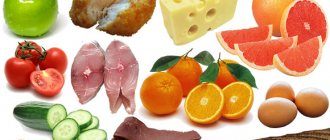Why should you follow a diet in the last months of pregnancy?
From the 30th week, expectant mothers often experience swelling, heaviness in the digestive organs, loss of strength and lack of vigor. All this can develop against the background of poor nutrition.
After a woman sees 2 coveted stripes on the test, her refrigerator, or rather the products that are in it, should immediately change. Instead of fatty, salty, smoked and pickled foods, you need to give preference to baked, fresh and boiled natural products. Instead of eating 3 times a day, doctors advise eating 5-6 times a day in small portions. Nutrition in the last weeks of pregnancy should be as healthy, varied and light as possible. Otherwise, you can forget about feeling normal.
During the 8th and 9th months of gestation, the foods taken by the mother should contain sufficient amounts of vitamins, iron, folic acid, calcium and other microelements. Also, the diet in the last weeks of pregnancy must necessarily combine the optimal level of fats, proteins and carbohydrates. And also take into account the need of the female body for these components of proper nutrition.
Attention! It is especially important for expectant mothers to monitor their weight. Try not to allow his gain to be more than 600 grams per week. Otherwise, this is fraught with the development of serious health problems. And it is not advisable to “acquire” them in the last weeks of pregnancy.
It is the adherence to the correct diet while carrying a baby that will allow you to keep your weight normal, without leading to complications such as poor or, conversely, excessive weight gain.
Nutrition in the last month of pregnancy, or rather the menu of a pregnant woman, should be done wisely. It is better to eat food at the same time, in small portions. At the same time, you should try to chew your food thoroughly. Between 3 main meals, you need to make light snacks, which should be quite nutritious and varied.
How to prevent weight gain
Proper nutrition and a feasible level of physical activity will help you avoid gaining weight beyond the required level. During the entire period of carrying a child, a woman must control how much food she has eaten, as well as what quality it is. Eating small, frequent meals and eating a variety of foods will help you avoid the constant feeling of hunger that is often annoying during pregnancy.
Nutritional features in the 1st trimester of pregnancy
In the initial stages, the woman continues to eat as before pregnancy. But some quirks also appear when you really want something specific. The set of products should be varied in order to provide the fetus with all the microelements it needs. The daily diet provides for sufficient consumption of proteins, fats, carbohydrates and microelements. We offer you a weekly menu option.
Sample menu for the week - table
| Day of the week | Breakfast | Dinner | Afternoon snack | Dinner |
| Mon | 1. Cheese. 2. Omelet with champignons. 3. Varenets. 4. Apple. | 1. Squid salad with olives. 2. Boiled fish fillet. 3. Juice. | 1. Cottage cheese. 2. Apple. | 1. Tomato. 2. Chicken fillet baked with potatoes. 3. Yogurt. |
| VT | 1. Cottage cheese. 2. Boiled egg. 3. Berry compote. | 1. Vegetable salad with oil 2. Lean pork chop. 3. Juice. | 1. Walnuts. 2. Cottage cheese. | 1. Buckwheat porridge. 2. Steamed cod fillet. 3. Herbal tea. |
| SR | 1. Cheese. 2. Boiled egg. 2. Fresh fruit compote. 3. Banana. | 1. Vegetable salad, dressed with oil. 2. Chicken soup. 3. Tea with lemon. | 1. Low-fat kefir. 2. Butter bun. 3. Pear. | 1. Boiled cauliflower. 2. Baked chicken breast. 3. Green tea. |
| Thu | 1. Millet porridge with milk. 2. Green tea. | 1. Vegetable soup. 2. Chicken cutlet. 3. Grated carrots. | 1. Walnuts. 2. Cottage cheese. 3. Apple. | 1. Lettuce. 2. Fish baked with carrots. 3. Low-fat yogurt. |
| PT | 1. Scrambled eggs and ham. 2. A glass of juice. | 1. Bean soup. 2. Boiled turkey. 3. Bread 1 piece. 4. Apple. | 1. Peanuts. 2. A glass of juice. | 1. Boiled chicken fillet. 2. Rice with stewed vegetables. 3. Tea with lemon. |
| SB | 1. Milk soup. 3. Cocoa with milk. | 1. Cucumber salad with herbs. 2. Steamed beef cutlets. 3. A glass of vegetable juice. | 1. Cottage cheese. 2. Low-fat kefir. | 1. Milk. 2. Cheese. 3. Boiled fish. 4. Green tea. 5. Some fresh berries. |
| Sun | 1. Buckwheat porridge with milk. 2. Cheese. 3. Berry compote. | 1. Chicken fillet. 2. Steamed vegetables. 3. A glass of juice. | 1. Low-fat yogurt. 2. Butter bun | 1. Fruit salad. 2. Boiled turkey. 3. Herbal tea. |
During this period, fluid consumption is not specifically limited: together with soups, it is about two liters per day. We give preference to mineral waters, juices, compotes and fruit drinks.
Diet in the 2nd trimester
Starting from week 13, you need to eat 4-6 times a day. We definitely add a second breakfast. Each meal should be complete: every day a woman should consume up to 3,000 kcal, about 125 g of protein, 85 g of fat and 375 g of carbohydrates.
The set of products for every day contains:
- fruits vegetables;
- various cereals;
- meat and fish products;
- milk, butter, kefir;
- nuts and dried fruits;
- compotes, herbal and green tea.
All necessary components must be included in the diet of pregnant women.
The following foods should be avoided:
- alcohol and cocktails containing it;
- canned food and semi-finished products;
- confectionery products;
- fruits that cause allergies;
- hot spices.
Nutrition in the 3rd trimester
During this period there is active growth of the fetus, and often a woman is constantly hungry. It is necessary to carefully monitor weight gain; weighing is carried out weekly. The set of products and daily calorie content remain the same as in the previous period. Starting from week 25, protein and calcium intake should be reduced, since the formation of tissues and organs in the fetus is completed and the need for building material decreases. During this period, it is preferable to consume vegetable fats and slowly digestible carbohydrates. If you are gaining weight quickly, you can try the following eating schedule:
- For breakfast, porridge from various cereals and herbal tea are best;
- for the next breakfast we take cottage cheese or any fruit;
- for lunch we prepare vegetable soups with pieces of meat or fish;
- for dinner we will prepare a vegetable salad, boiled chicken or any meat and baked vegetables;
- at the end of the day, if you get hungry, you can drink kefir, juice or eat fruit.
There is no clear opinion regarding fluid consumption in the 3rd trimester: some experts recommend reducing the amount you drink to 1–1.2 liters. Others believe that if excess water does not accumulate in the body, there is no edema, there is no need to limit yourself.
Drinking regime in the last month of pregnancy
By eating right, the expectant mother will be able to protect herself from the development of edema. It is they who significantly complicate the work of the female body, along with a large belly. The amount of fluid the patient drinks throughout the day also plays a significant role.
The “drinking” menu for the 9th month of pregnancy is as follows:
- the amount of tea, coffee, and even more so soda should be kept to a minimum;
- You should try to drink 2-2.5 liters of clean water per day, which depends on the woman’s build and physique;
- Natural juices, compotes, fruit drinks and dairy products are required in the daily diet.
Proper and balanced nutrition at the end of pregnancy will help protect the expectant mother from heartburn, which brings many unpleasant symptoms for a pregnant woman. To get rid of it, doctors advise drinking half a glass of milk or lightly salted mineral water after each meal (it is better to choose it without gas).
Protein diet during pregnancy: menu
The daily diet of a pregnant woman should contain 100-130 grams of proteins, and 80-100 g of them should be of animal origin. It is better to eat the bulk of protein food at lunch. Sample menu for a protein diet during pregnancy for weight loss:
| Breakfast | Lunch | Dinner | Afternoon snack | Dinner | |
| Option 1 |
| Apple |
| A glass of kefir |
|
| Option 2 |
| Banana |
|
|
|
| Option 3 |
| Cottage cheese with bran |
| Green tea with milk |
|
| Option 4 |
| A glass of kefir |
| Cottage cheese with berries |
|
Recommended Products
Some foods in the last months of pregnancy cause constipation, bloating, and high gas formation, so following a diet is extremely necessary for the normal well-being of the expectant mother. To avoid problems with the digestive tract, doctors advise eating the following dishes and foods more often:
- soups (meat and vegetable);
- milk porridge (preferably liquid);
- dried fruits;
- fresh vegetables and fruits in moderation;
- dairy products.
Important! The nutrition of a pregnant woman in the 9th month of pregnancy should be monitored by a doctor, since prescribing a diet on your own is strictly prohibited. The doctor will take into account all the characteristics of the patient’s body and tell you which foods can be taken and what needs to be eliminated from the diet.
Food should not only be natural, but also cooked correctly
Recommendations for the content of nutrients in products
Although the last 2 months of gestation are equally difficult and difficult, during each of them the woman is required to adhere to a certain diet.
What to eat in the penultimate month of pregnancy:
- Particular preference should be given to beef, apples, cabbage, greens, spinach and liver. After all, they contain a large amount of iron;
- vegetable oil - it contains a high level of vitamin E. However, you should not eat it with spoons - just season the salad with it;
- Sources of vitamin C, which is very important for the health of mother and child, are fresh vegetables and some fresh fruits. But it is better to avoid citrus fruits, as they can cause allergies;
- meat, liver, legumes, cheeses and other dairy products, eggs and cereals are rich in vitamin B, so it is also advisable to include them in the daily diet;
- A prerequisite for pregnant women is calcium intake. It is found in large quantities in fish and dairy products;
- greens, fruits and vegetables contain essential folic acid, which is especially important for the female body, regardless of the stage of pregnancy.
What to eat at 9 months pregnant? In this case, the expectant mother’s diet needs to be slightly changed:
- Stewed vegetables, eggs, fresh vegetables and fruits, fruit drinks, milk and compotes based on dried fruits are of particular benefit to the body;
- do not exclude their menu from bran, yoghurts, cottage cheese, cheese, herbs, soups and kefir;
- you need to be careful when choosing dairy products - doctors advise choosing low-fat products;
- Porridge should be present in the diet every day. You can eat everything except semolina, since it is a heavy food.
What to give up
What should pregnant women not eat in their last month? The list of prohibited products includes:
- seafood;
- chocolate and other sweets;
- mushrooms;
- citrus;
- honey;
- fast food;
- smoked, pickled and salted products;
- soda.
Attention! It is important to try to choose not only natural food, but also monitor its quality. It is permissible to eat only fresh foods that cannot become the culprits in the development of food poisoning. Otherwise, serious harm may be caused to the health of the mother and child.
What does a sample menu look like in the last month of pregnancy?
Nutritionists advise expectant mothers to eat small portions at the same time. This will help avoid overeating and will not put too much strain on the digestive organs.
The diet for the 9th month of pregnancy should look like this:
Breakfast
It is best to start your first meal with porridge. The most optimal and healthy option is oatmeal, rice or buckwheat porridge with milk. To saturate your body, it is recommended to eat a boiled egg or a small piece of boiled low-fat meat.
You can end your first meal with a glass of milk or unsweetened tea with a cracker or biscuits. It is recommended to avoid instant cereals, flakes and muesli, as they often contain a lot of dyes and preservatives.
Dinner
At lunchtime, it is best to eat light soups cooked in low-fat broth. An excellent option is solyanka, cabbage soup, chicken or fish soup. It is advisable to try to eat hot liquid food first, as it has a great effect on digestion and improves the functioning of the entire gastrointestinal tract.
For the second course, you can cook porridge, a light salad of vegetables or fruits, potatoes, pilaf or other favorite dishes. They will have maximum benefits, but few calories. The main thing is not to make dishes too salty or seasoned. It is not recommended to season salads with mayonnaise. It is better to replace it with butter or low-fat sour cream. Don't forget the bread. It will not only make you feel full, but will also help add many useful substances to the body.
Dinner
The last meal should be light, but nevertheless nutritious, so that the expectant mother does not want to eat throughout the night. You can cook porridge, vegetable stew, stewed potatoes or other favorite recipes. The last meal should be taken 2-3 hours before bedtime, which will help avoid heartburn and also not strain the digestive organs before a night's rest.
Video: diet in the last month of pregnancy
Other Diet Conditions
In between main meals, you can eat fruits, drink yogurt or kefir, cottage cheese, toast with cheese, and so on. This will help make you feel full and prevent you from feeling hungry throughout the day.
Particular attention must be paid to the drinking regime. The expectant mother should drink at least 1-1.2 liters of water per day. But it is important to take into account the presence or absence of edema. If they are present, you should drink only 700-800 ml of any liquid.
By following the menu correctly in the last month of pregnancy, you can avoid many health problems. And also feel good during the most difficult weeks of bearing a baby. The main thing is to agree on your own menu with your doctor, since the patient’s nutrition must be comprehensive and balanced.
Diet for pregnant women
Everyone already knows that excess weight has a bad effect not only on your figure, but also on your health. And if expectant mothers are overweight, this also harms the baby. But even if you don’t have such a problem, you still need a special diet for pregnant women. As soon as a new life is born in you, your own must change. Proper nutrition will determine how your baby will be born. Most women believe that they need to eat for two. And then they can’t get rid of extra pounds. Yes, the calorie content increases a little, but this has virtually no effect on body weight. A pregnant woman should gain no more than 1-1.5 kg per month.
↑ click
If before pregnancy you led a healthy lifestyle and monitored your diet, then most likely there will be virtually no changes.
However, if you like intense physical activity, then you definitely need to consult a doctor on how to behave in this situation. It is clear that there is special gymnastics for pregnant women and you may have to switch to a more relaxed sport for some time. When composing diets for pregnant women, the menu must include foods that include proteins, fats and carbohydrates. In addition, at first, calorie content should not exceed 1800 calories. And if you turned a blind eye to this before, now you should think about proper nutrition. In the first trimester, all the important organs of the child are formed, and protein serves as the building material for them, so it must be contained in the right amount every day. A protein diet is very important for pregnant women in the second and third trimester, because the fetus grows throughout its entire stay in the mother’s womb. You should not give up fats, since without them the necessary vitamins and microelements will not be absorbed.
Nutritional features of expectant mothers
What is special about nutrition for pregnant women? Strictly speaking, the most important thing is balance and moderation in everything. Everything is exactly the same as in the diet of all people. You should eat small portions, but up to five times a day, eat plenty of fresh vegetables and fruits, and drink clean water. Every day you need to eat about 50 grams of protein in the first trimester, about 100 in the second and third. It is advisable to get more than half of the protein from animal products: meat, fish, cottage cheese, eggs. The last meal should be 3 hours before bedtime. There is no need to overload the body, because this can have a bad effect on the baby.
It is better to cook, stew or bake dishes without oil. It is necessary to reduce your salt intake, as it retains fluid in the body and can cause swelling and weight gain. Set aside foods that are generally not recommended to be consumed, especially during pregnancy. These include candies, cakes, chocolate, baked goods, ice cream, fatty cheeses, fast food, fried eggs. Also limit your consumption of foods such as mushrooms, sweet fruits (grapes, melons, pears, bananas), canned and spicy snacks, strong tea, coffee, cocoa, spices and seasonings. If it’s difficult to completely eliminate them, just reduce their number.





